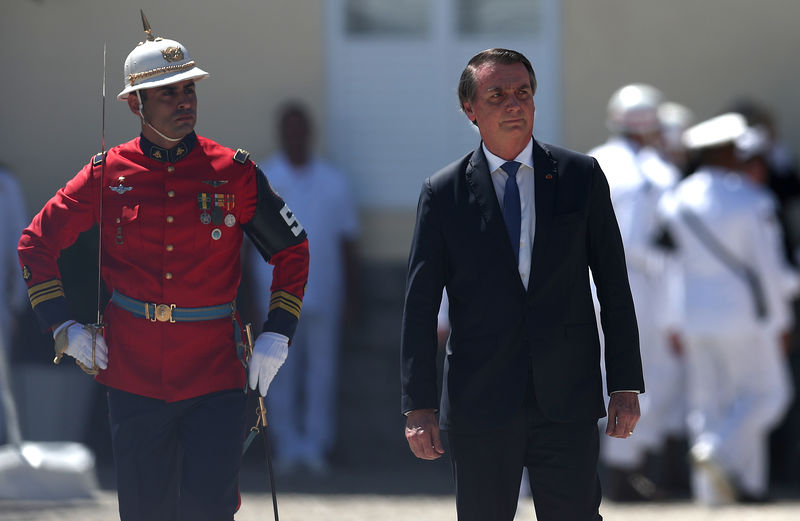By Rodrigo Viga Gaier
RIO DE JANEIRO (Reuters) - Brazil's far-right president on Thursday described the country's armed forces, which led the country under a military dictatorship for over two decades, as the ultimate arbiters of democracy.
Speaking at a naval event in Rio de Janeiro alongside some of the former generals who sit in his cabinet, Jair Bolsonaro praised Brazil's military.
"Democracy and liberty only exist when your armed forces want them to," said Bolsonaro, himself a former army captain.
Critics of Bolsonaro, a longtime advocate of Brazil's 1964-1985 military dictatorship, have expressed concern over the growing role of high-ranking former soldiers in his government.
Speaking with reporters in Brasilia, Vice President Hamilton Mourao defended Bolsonaro's comments, which he said were not meant as a threat.
"The president said that if the armed forces are not committed to democracy and freedom, those values die. That is what has happened in Venezuela, where the Venezuelan armed forces tore those values up," Mourao said.
Bolsonaro was joined at the event by his national security adviser, former General Augusto Heleno, and his Defense Minister, former General Fernando Azevedo e Silva. Other former generals in his cabinet include Infrastructure Minister Tarcisio Freitas and Government Minister Carlos Alberto dos Santos Cruz, a retired general. Vice President Mourao is also a former general.
One of Bolsonaro's immediate legislative priorities is to win approval for a much-needed pension reform to prop up the country's rickety public finances. The former generals have been advocating for the military, which enjoys sizeable benefits under the current system, to be excluded or protected from the new measures.
However, Bolsonaro reiterated in his speech that the military will not escape the reforms.
"What I want from you is a sacrifice," he said, noting that the new system "will affect the military." He gave no further details.
Bolsonaro's proposal to address a widening pension deficit by raising taxes, delaying retirements and creating individual savings accounts is the cornerstone of his economic agenda.

Last month, he delivered his proposal to Congress, aiming to save over 1 trillion reais ($266 billion) in the next decade. Most economists agree the system must be overhauled to shore up public finances and foster growth.